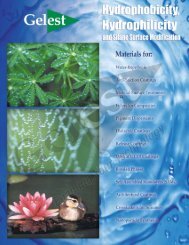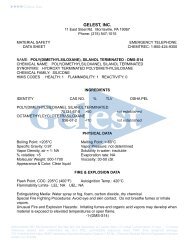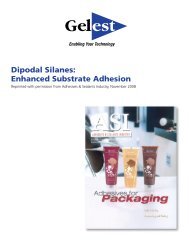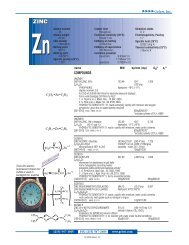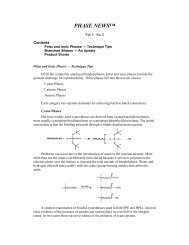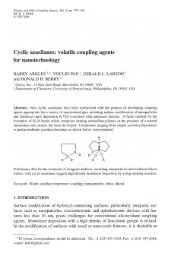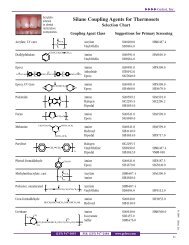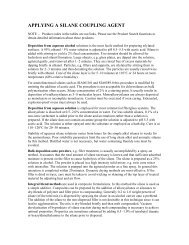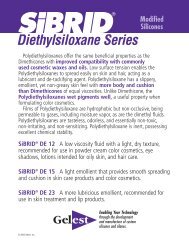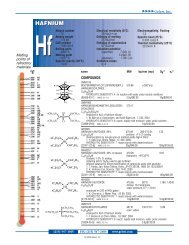Gelest Silicone Fluids - Gelest Inc.
Gelest Silicone Fluids - Gelest Inc.
Gelest Silicone Fluids - Gelest Inc.
Create successful ePaper yourself
Turn your PDF publications into a flip-book with our unique Google optimized e-Paper software.
▲<br />
▲<br />
▲<br />
▲<br />
<strong>Gelest</strong>, <strong>Inc</strong>.<br />
Properties of Conventional <strong>Silicone</strong> <strong>Fluids</strong> (Polydimethylsiloxanes) – continued<br />
Polydimethylsiloxane properties that do not vary signifcantly for fluids with viscosities greater than 10 cSt. are listed below.<br />
Reactivity<br />
While they exhibit low reactivity under many conditions, certain<br />
environments are destructive to silicone fluids. Hydrogen<br />
fluoride, for example, attacks the silicone-oxygen bond to<br />
produce dimethylsilyl fluorides and water, which generate<br />
corrosive gases. Strong bases such as methanolic potassium<br />
hydroxide destroy silicone fluids and create resinous<br />
byproducts.<br />
Thermal degradation at elevated temperatures causes<br />
rearrangement of the silicone-oxygen bonds to produce<br />
volatile byproducts. Free-radical reaction of the methyl groups<br />
to form cross-linked materials by oxidation with peroxy compounds<br />
increases fluid viscosity and causes the fluid to gel.<br />
Solubility of fluids<br />
Methylene chloride, chlorofluorocarbons, ethyl ether, xylene<br />
and methylethyl ketone are typical solvents for dimethylsiloxanes.<br />
Low viscosity polymers are also soluble in acetone,<br />
ethanol, dioxane and dihexyladipate. They are insoluble in<br />
methanol, cyclohexanol and ethylene glycol. The solubility<br />
parameter for 100 cSt. fluid is 7.4.<br />
Solubility of Gases<br />
Gas<br />
ml gas/ml liquid @25°C<br />
Nitrogen 0.16-0.17<br />
Carbon Dioxide 1.00<br />
Air 0.16-0.19<br />
Hydrogen 0.11-0.12<br />
Gaseous Permeability of Polydimethylsiloxane<br />
Gas P* x 10 9<br />
H2 97<br />
He 52<br />
NH3 885<br />
H20 5400<br />
CO 51<br />
N2 42<br />
NO 90<br />
02 90<br />
H2S 1500<br />
Ar 90<br />
CO2 410<br />
*cm 3 /s . cm 2 . cm Hg<br />
values adjusted from filled silicone membranes<br />
Gas P* x 10 9<br />
N2O 650<br />
NO2 1140<br />
SO2 2250<br />
CS2 1350<br />
CH4 142<br />
C2H6 375<br />
C2H4 200<br />
C2H2 3960<br />
C3H8 615<br />
n-C4H10 1350<br />
n-C5H12 3000<br />
Gas P* x 10 9<br />
n-C6H14 1410<br />
n-C8H18 1290<br />
n-C10H22 645<br />
HCHO 1665<br />
CH3OH 2085<br />
COCI2 2250<br />
Acetone 835<br />
Pyridine 2865<br />
Benzene 1620<br />
Phenol 3150<br />
Toluene 1370<br />
Thermal<br />
Specific heat<br />
0.35-0.37 cal/gm/°C<br />
Heat of formation<br />
-2.41 Kcal/gm<br />
Heat of combustion (>50 cSt.)<br />
6.13 Kcal/gm<br />
Glass transition temperature<br />
-128°C<br />
Gel time, 150°C<br />
indefinite<br />
Gel time for intermediate viscosity fluids, 200°C 200 hours<br />
Gel time for high viscosity fluids, 200°C 100 hours<br />
Autoignition temperature greater than 460°C<br />
12<br />
MANUFACTURERS OF SILANES AND SILICONES


